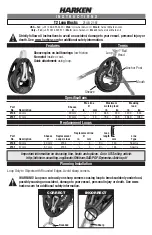
14
3.2 ROLL Mode
When the trigger mode is auto, adjust the SCALE knob in the horizontal
control area to change the horizontal scale to be slower than 40ms/div, the
oscilloscope will be in ROLL mode and will continuously plot the voltage-time
trend chart of the waveform on the screen. The earliest waveform first appears
on the right end of the screen, then gradually moves to the left, as shown
below:
Use the slow sweep mode to observe the low frequency signal, it is
recommended to set the “channel coupling” mode to “DC”.
Note: “Horizontal displacement”, “extended window”, “protocol decoding”,
“pass/fail”, “parameter measurement”, “waveform recording’, “waveform
brightness”, and “independent time base” are not available in ROLL mode.
3.3 Extended Window
The extended window can be used to magnify a waveform horizontally to
view the waveform details.
Press the HORI MENU button on the horizontal control area, then press
the type key to turn on the extended window. Or simply press the SCALE
knob on the horizontal control area to directly enter the extended window,
the screen will be divided into two display areas, as shown below:
Waveform before Magnification:
The upper part of the screen displays the original waveform, which can be
moved left and right through rotating the horizontal POSITION knob, or zoom
in and out the selected area by rotating the horizontal SCALE knob.
Waveform after Magnification:
The lower part of the screen displays the horizontally extended waveform,
the extended window enhances the resolution relative to the main time base.
Note:
The extended window function is only available when the horizontal
time base is in the range of 20ms/div ~ 4us/div.
Waveform before magnification
Extended time base
Main
time
base
Waveform after magnification
3.4 Independent Time Base
In independent time base, CH1~CH4 can be set to different time base so that
user can observe different frequency signals in multiple channels at the same
time. Press the HORI MENU time base setting to enter the independent
time base.
















































